reflection on learning English
- 格式:docx
- 大小:14.17 KB
- 文档页数:1

Reflection 5My goalsToo many people wander through life like sleep-walkers. Each day they follow familiar routines, never asking, "What am I doing with my life?" and they don't know what they're doing because they lack goals.Goal-setting is a focusing of the will to move in a certain direction. I was told all the time that people should write down their goals and time table and chase after their goals persistently. I have never done this work but I think that it’s quite smart and useful to write down wh at you want so that you won’t lose your direction.I would like to share my goal. I want to be a great interpreter! I will seize the chance to meet the distinguished and influential people.That’s my long-term goal. For now, I have some short-term goals.Fi rstly, I’m going to get high marks in this semester. The point should reach 3.8 or more.Secondly, I’m going to participate in the interpreting competition in next semester. And that means I should word hard on my interpreting skills.Finally, I’m going to p articipate in the AIESEC in my third year or the fourth year in the university. Finally, I’m going to participate in the WIN IN ZHONGDA in my second or third year, which means I should begin to think about the ideas and get to know more students from other schools.Every person there is a great potential and that the real potential is found from their own, and tap them. As long as you continue to inspire and enhance their confidence and make efforts to transform them, I believe that one day you will become the one who is worshipped by others.。
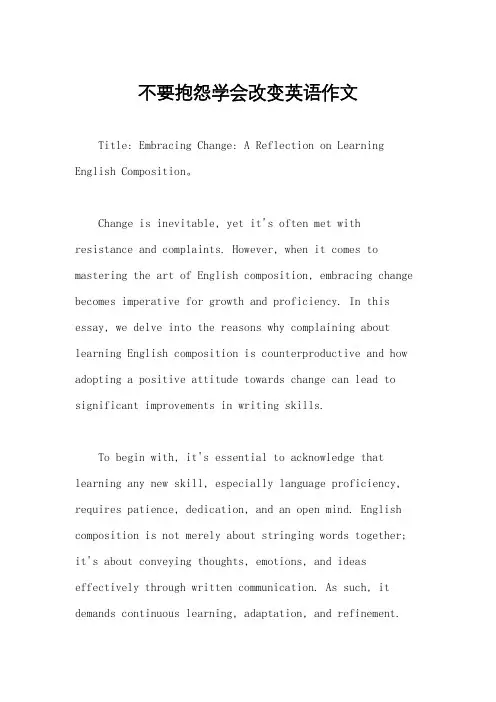
不要抱怨学会改变英语作文Title: Embracing Change: A Reflection on Learning English Composition。
Change is inevitable, yet it's often met with resistance and complaints. However, when it comes to mastering the art of English composition, embracing change becomes imperative for growth and proficiency. In this essay, we delve into the reasons why complaining about learning English composition is counterproductive and how adopting a positive attitude towards change can lead to significant improvements in writing skills.To begin with, it's essential to acknowledge that learning any new skill, especially language proficiency, requires patience, dedication, and an open mind. English composition is not merely about stringing words together; it's about conveying thoughts, emotions, and ideas effectively through written communication. As such, it demands continuous learning, adaptation, and refinement.Complaining about the challenges of learning English composition only serves to hinder progress. Instead of focusing on the difficulties, it's more constructive to channel that energy into finding solutions and improving skills. Every obstacle presents an opportunity for growth, and by embracing these challenges, individuals can develop resilience and resourcefulness in their writing journey.Moreover, complaining about learning English composition overlooks the privilege of being able to acquire such a valuable skill. English is widely regarded as the global language of communication, opening doors to countless opportunities in education, career, and personal development. Rather than lamenting the effort required to master it, learners should approach it with gratitude and enthusiasm, recognizing the doors it can unlock.Furthermore, change is inherent in language itself. English, like any living language, evolves over time, influenced by cultural shifts, technological advancements, and global interactions. Embracing change in Englishcomposition means staying attuned to these developments, adapting writing styles, vocabulary, and conventions to suit contemporary contexts. Resisting change only leads to stagnation, whereas embracing it fosters relevance and effectiveness in communication.Additionally, learning English composition is not merely a solitary endeavor but a collaborative process. Engaging with peers, mentors, and resources fosters a supportive learning environment where feedback, critique, and encouragement propel growth. Complaining about the challenges of writing isolates individuals from this community of learners, depriving them of valuable insights and perspectives that could enhance their skills.Moreover, the mindset with which one approaches learning English composition significantly influences outcomes. A positive attitude towards change cultivates resilience, creativity, and a willingness to experiment with different writing techniques. Conversely, a negative mindset fueled by complaints breeds stagnation, fear of failure, and reluctance to step out of one's comfort zone.In conclusion, complaining about learning English composition is unproductive and detrimental to growth. Instead of focusing on the challenges, learners should adopt a positive attitude towards change, viewing it as an opportunity for growth, adaptation, and improvement. By embracing change, acknowledging the privilege of acquiring language skills, and fostering a collaborative learning environment, individuals can navigate the complexities of English composition with confidence and proficiency. As the saying goes, "Change is the only constant," and in the realm of English composition, embracing change is the key to success.。
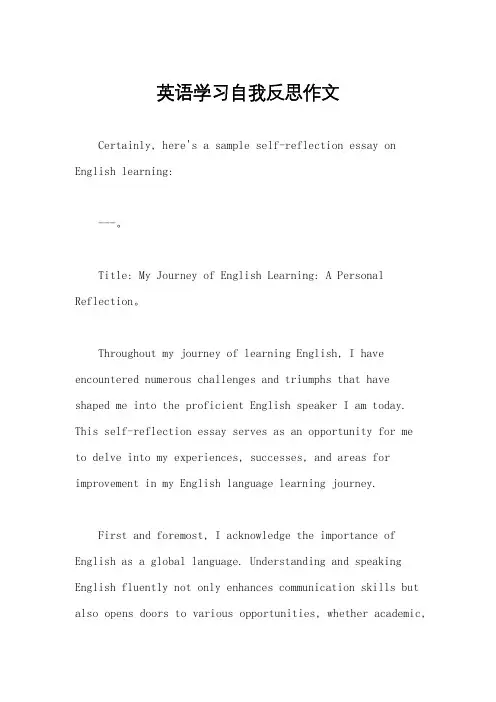
英语学习自我反思作文Certainly, here's a sample self-reflection essay on English learning:---。
Title: My Journey of English Learning: A Personal Reflection。
Throughout my journey of learning English, I have encountered numerous challenges and triumphs that have shaped me into the proficient English speaker I am today. This self-reflection essay serves as an opportunity for meto delve into my experiences, successes, and areas for improvement in my English language learning journey.First and foremost, I acknowledge the importance of English as a global language. Understanding and speaking English fluently not only enhances communication skills but also opens doors to various opportunities, whether academic,professional, or personal. With this awareness, I embarked on my English learning journey with determination and enthusiasm.One of the initial challenges I faced was grasping the intricacies of English grammar. From understanding the difference between present perfect and past simple to mastering complex sentence structures, I found myself grappling with various grammar rules. However, through consistent practice and perseverance, I gradually improved my grammar skills. Engaging in grammar exercises, seeking clarification from teachers, and utilizing online resources proved instrumental in overcoming this hurdle.Additionally, building vocabulary posed another significant challenge. The English language boasts a vast lexicon, comprising words with diverse meanings and nuances. Initially, I struggled to memorize and retain newvocabulary words. Nonetheless, I adopted effectivestrategies such as creating flashcards, reading extensively, and actively incorporating new words into my conversations and writing. Over time, my vocabulary expanded, allowing meto express myself more eloquently and precisely.Furthermore, developing proficiency in spoken English required me to overcome my fear of making mistakes and to embrace opportunities for practice. Participating in English speaking clubs, engaging in discussions with native speakers, and watching English movies with subtitles helped me enhance my speaking skills and gain confidence. While I encountered moments of hesitation and self-doubt, I learned to view mistakes as learning opportunities and persisted in refining my spoken English.Moreover, I recognize the importance of cultural immersion in language learning. Exposure to authentic English materials, such as literature, films, and music, not only enriched my language skills but also deepened my understanding of English-speaking cultures. Immersing myself in English-speaking environments through travel and cultural exchanges provided invaluable opportunities for linguistic and cultural immersion, facilitating my language acquisition process.In retrospect, my English learning journey has been characterized by perseverance, dedication, and continuous improvement. While I have made significant progress, I acknowledge that there is always room for growth. Moving forward, I am committed to honing my English skills further, whether through advanced language courses, immersive experiences, or continued self-study.In conclusion, my journey of English learning has beena rewarding and transformative experience. Through overcoming challenges, embracing opportunities for growth, and maintaining a positive attitude, I have developed proficiency in English that extends beyond linguistic competence to encompass cultural understanding and global communication skills. As I embark on the next phase of my language learning journey, I am excited to continue expanding my horizons and embracing the richness of the English language and its diverse cultures.。
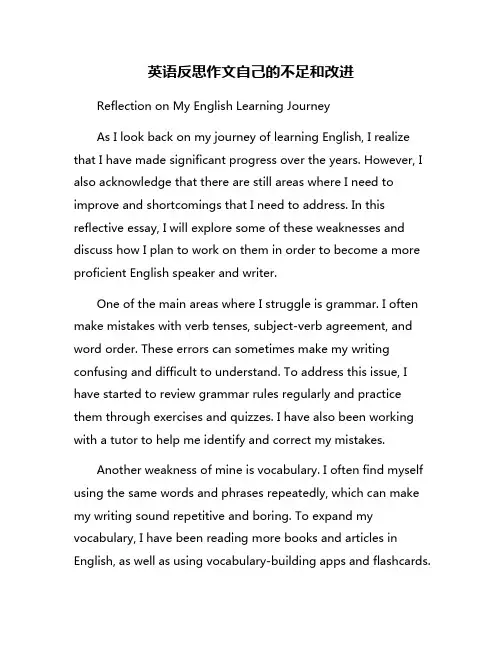
英语反思作文自己的不足和改进Reflection on My English Learning JourneyAs I look back on my journey of learning English, I realize that I have made significant progress over the years. However, I also acknowledge that there are still areas where I need to improve and shortcomings that I need to address. In this reflective essay, I will explore some of these weaknesses and discuss how I plan to work on them in order to become a more proficient English speaker and writer.One of the main areas where I struggle is grammar. I often make mistakes with verb tenses, subject-verb agreement, and word order. These errors can sometimes make my writing confusing and difficult to understand. To address this issue, I have started to review grammar rules regularly and practice them through exercises and quizzes. I have also been working with a tutor to help me identify and correct my mistakes.Another weakness of mine is vocabulary. I often find myself using the same words and phrases repeatedly, which can make my writing sound repetitive and boring. To expand my vocabulary, I have been reading more books and articles in English, as well as using vocabulary-building apps and flashcards.I have also been trying to incorporate new words into my writing and speaking whenever possible.In addition to grammar and vocabulary, I have also struggled with pronunciation. My accent can sometimes make it difficult for others to understand me, especially when I am speaking quickly or using unfamiliar words. To improve my pronunciation, I have been practicing with language exchange partners and watching videos of native speakers. I have also been working on my intonation and stress patterns to sound more natural and fluent.Another area where I need to improve is my listening skills. I often have trouble understanding fast-paced conversations or speakers with strong accents. To address this issue, I have been listening to podcasts, watching movies and TV shows in English, and practicing with listening comprehension exercises. I have also been working on my note-taking skills to help me better retain and understand what I hear.Overall, I am committed to continuing to work on these weaknesses and becoming a more proficient English speaker and writer. I know that progress takes time and effort, but I am dedicated to improving and reaching my goals. By identifying my shortcomings and taking proactive steps to address them, Iam confident that I will be able to overcome these challenges and become more confident in my English language abilities.。
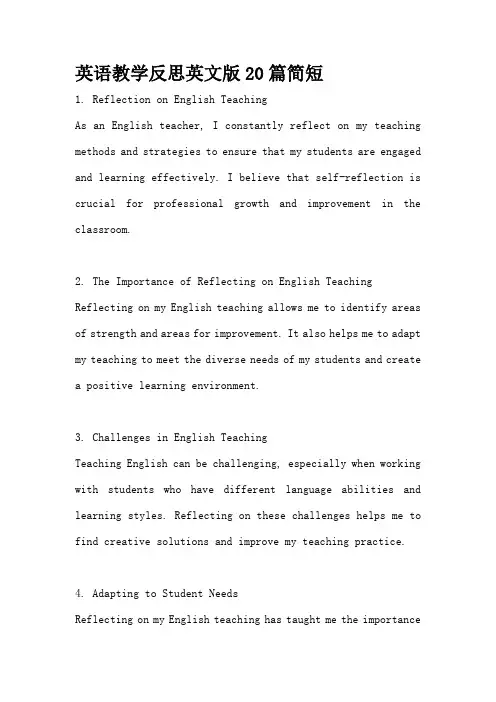
英语教学反思英文版20篇简短1. Reflection on English TeachingAs an English teacher, I constantly reflect on my teaching methods and strategies to ensure that my students are engaged and learning effectively. I believe that self-reflection is crucial for professional growth and improvement in the classroom.2. The Importance of Reflecting on English Teaching Reflecting on my English teaching allows me to identify areas of strength and areas for improvement. It also helps me to adapt my teaching to meet the diverse needs of my students and create a positive learning environment.3. Challenges in English TeachingTeaching English can be challenging, especially when working with students who have different language abilities and learning styles. Reflecting on these challenges helps me to find creative solutions and improve my teaching practice.4. Adapting to Student NeedsReflecting on my English teaching has taught me the importanceof adapting my lessons to meet the individual needs of my students. This may involve modifying my teaching methods, providing additional support, or offering alternative learning materials.5. Engaging Students in English LearningReflecting on my teaching has shown me the value of engaging students in their English learning. By incorporating interactive activities, real-life examples, and technology into my lessons, I can create a more dynamic and enjoyable learning experience for my students.6. Building a Positive Learning EnvironmentReflecting on my English teaching has highlighted the significance of creating a positive and inclusive learning environment. By fostering a supportive classroom culture, I can encourage my students to participate, take risks, and develop their English language skills with confidence.7. Using Feedback to ImproveReflecting on feedback from students, colleagues, and supervisors has been instrumental in improving my Englishteaching. By considering and acting on constructive feedback, I can refine my teaching methods and enhance the learning experience for my students.8. Embracing Continuous Professional DevelopmentReflecting on my English teaching has reinforced the importance of continuous professional development. By seeking out new teaching strategies, attending workshops, and staying informed about current trends in English education, I can continue to grow as an effective teacher.9. Balancing Traditional and Innovative Approaches Reflecting on my English teaching has shown me the value of balancing traditional teaching methods with innovative approaches. By incorporating a variety of instructional techniques, I can cater to the diverse learning preferences of my students and keep them engaged in their English learning.10. Celebrating Progress and AchievementsReflecting on my English teaching has reminded me to celebrate the progress and achievements of my students. By acknowledging their efforts and successes, I can motivate them to continuedeveloping their English language skills and build their confidence as learners.11. Overcoming Language BarriersReflecting on my English teaching has taught me how to overcome language barriers in the classroom. By using visual aids, gestures, and simplified language, I can help my students understand and engage with the English content more effectively.12. Fostering a Love for English LearningReflecting on my teaching has reinforced the importance of fostering a love for English learning in my students. By making my lessons enjoyable, relevant, and meaningful, I can inspire my students to become lifelong learners of the English language.13. Cultivating Critical Thinking SkillsReflecting on my English teaching has shown me the value of cultivating critical thinking skills in my students. By encouraging them to analyze, evaluate, and apply their English language knowledge, I can help them become more independent andproficient language users.14. Promoting Cultural AwarenessReflecting on my English teaching has highlighted the significance of promoting cultural awareness in the classroom. By incorporating diverse perspectives, literature, and discussions into my lessons, I can help my students appreciate and respect different cultures while improving their English language skills.15. Collaborating with ColleaguesReflecting on my English teaching has emphasized the importance of collaborating with colleagues. By sharing ideas, resources, and best practices, I can enhance my teaching and contribute to a supportive and professional English teaching community.16. Embracing Technology in English TeachingReflecting on my teaching has shown me the value of embracing technology in English education. By integrating digital tools, multimedia resources, and online platforms into my lessons, I can enhance the learning experience and prepare my students for the digital age.17. Supporting English Language LearnersReflecting on my English teaching has taught me how to better support English language learners. By providing additional language support, scaffolding, and differentiated instruction, I can help my students develop their English language skills at their own pace.18. Encouraging Student AutonomyReflecting on my English teaching has reinforced the importance of encouraging student autonomy. By providing opportunities for self-directed learning, goal setting, and reflection, I can empower my students to take ownership of their English language development.19. Reflecting on Assessment and FeedbackReflecting on my English teaching has highlighted the significance of effective assessment and feedback. By using a variety of assessment methods and providing timely, constructive feedback, I can help my students track their progress and improve their English language skills.20. Looking Ahead in English TeachingReflecting on my teaching has inspired me to look ahead and consider the future of English education. By staying informed about new methodologies, technologies, and trends, I can continue to evolve as an effective English teacher and prepare my students for success in the global community.。
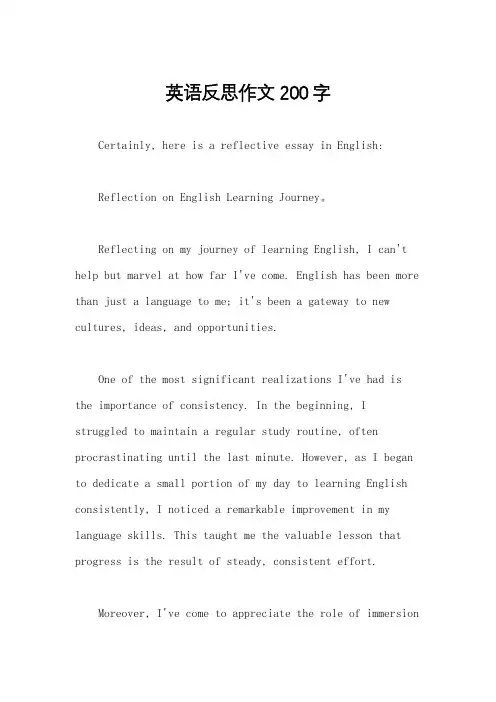
英语反思作文200字Certainly, here is a reflective essay in English:Reflection on English Learning Journey。
Reflecting on my journey of learning English, I can't help but marvel at how far I've come. English has been more than just a language to me; it's been a gateway to new cultures, ideas, and opportunities.One of the most significant realizations I've had is the importance of consistency. In the beginning, I struggled to maintain a regular study routine, often procrastinating until the last minute. However, as I began to dedicate a small portion of my day to learning English consistently, I noticed a remarkable improvement in my language skills. This taught me the valuable lesson that progress is the result of steady, consistent effort.Moreover, I've come to appreciate the role of immersionin language learning. Watching English movies, listening to English music, and conversing with native speakers have all contributed immensely to my language acquisition. Immersion not only enhances vocabulary and comprehension but also provides insight into the cultural nuances embedded within the language.Another aspect of my English learning journey that I've reflected upon is the importance of making mistakes. Initially, I was afraid of speaking incorrectly, fearing embarrassment or judgment. However, I've learned that mistakes are inevitable and serve as opportunities for growth. Each error is a stepping stone towards improvement, helping me refine my language skills and become more confident in my abilities.Furthermore, I've realized the significance of setting achievable goals. Whether it's mastering a specific grammar rule or expanding my vocabulary, setting realistic objectives has kept me motivated and focused on my learning journey. Celebrating small victories along the way has also boosted my confidence and reinforced my determination tocontinue progressing.In conclusion, my journey of learning English has been a rewarding and transformative experience. Through consistency, immersion, embracing mistakes, and setting achievable goals, I've witnessed significant growth in my language skills. As I continue on this journey, I'm excited to further refine my abilities and explore the endless opportunities that fluency in English affords.。
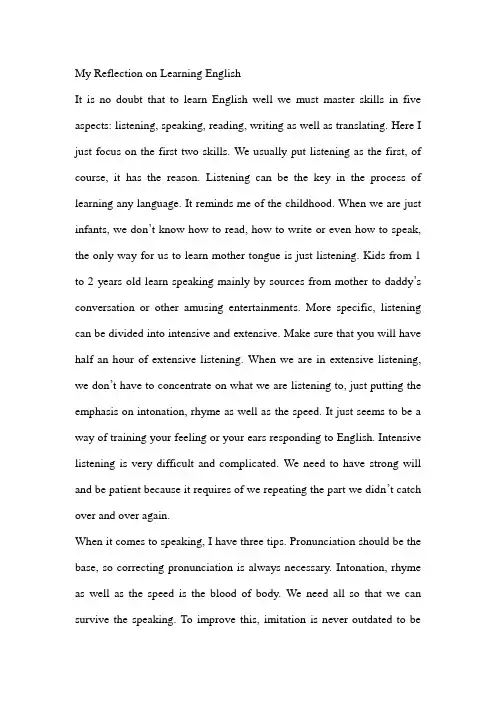
My Reflection on Learning EnglishIt is no doubt that to learn English well we must master skills in five aspects: listening, speaking, reading, writing as well as translating. Here I just focus on the first two skills. We usually put listening as the first, of course, it has the reason. Listening can be the key in the process of learning any language. It reminds me of the childhood. When we are just infants, we don’t know how to read, how to write or even how to speak, the only way for us to learn mother tongue is just listening. Kids from 1 to 2 years old learn speaking mainly by sources from mother to daddy’s conversation or other amusing entertainments. More specific, listening can be divided into intensive and extensive. Make sure that you will have half an hour of extensive listening. When we are in extensive listening, we don’t have to concentrate on what we are listening to, just putting the emphasis on intonation, rhyme as well as the speed. It just seems to be a way of training your feeling or your ears responding to English. Intensive listening is very difficult and complicated. We need to have strong will and be patient because it requires of we repeating the part we didn’t catch over and over again.When it comes to speaking, I have three tips. Pronunciation should be the base, so correcting pronunciation is always necessary. Intonation, rhyme as well as the speed is the blood of body. We need all so that we can survive the speaking. To improve this, imitation is never outdated to beapplied. The American TV dramas, BBC, VOA or the essays can be the source of imitation.Here I want to say more about oral English. Since I am not good at speaking, I spent a lot of time looking for a way to improve it. Finally I conclude my way. Just as a saying said, “learning English is like learning swimming. You will never acquire it unless you go into the water.” Here are some my tips for you to practice oral English:Firstly, spend half an hour talking to yourself. The topics can be anything, such as food, clothes, movie plot, music, story, news, joke or even your trouble. Speak English as possible as you can, if you don’t speak, then you don’t have chance to take mistakes and correct it. If condition permitting, use a cell phone to record what you have said, and listen to it. Try your best to find your flaws and make up for it.Secondly, go to English corner and talk to others. It’s better if you can find a foreigner. If you can’t, don’t worry. Non-native speaker also helps. It’s ridiculous that people believe only native speakers can help us improve English. Actually, our classmates also work. Why? They improved our grammar. The more grammar mistakes they expose in conversation, the less mistakes you will have in next talk.Last one is to recite. Our memory is just like a box. Only you often open it then you can get what you want. Try your best to read more and recite more. If you want to live a memorable life, then you have to memorize.Don’t complain to me that you don’t have time. You can squeeze it. We never know that how much time we have lost.I must say that there is no shortcut in learning a language. The best way is to repeat and imitate. To master a language, we must be expert on at least one skill of the five. You can poor in reading or writing, but you have to be excellent in the rest of all. If all the skill is middle or low, it is too dangerous. And in my opinion, listening and speaking are closely related. If you can do better in listening, then you have no problem in speaking. In the similar way, reading, writing and translating are also together. Of course, we need reading skill so that we can listen and speak. In fact, all the skills are linked to each other. The purpose we learn a language actually is to understand what a foreigner says and convey our ideas to them, so the ends of learning a language is translation. The way to test whether you are an advanced English learner is to check what your translating level is.我对英语学习的反思毫无疑问想学好英语我们必须掌握英语的五项技能:听、说、读、写和译。

英语反思200字英语作文Reflection on English Language Learning.Throughout my English language learning journey, I have encountered a myriad of challenges and triumphs that have shaped my understanding of both the language and myself.Initially, I grappled with the fundamental building blocks of grammar and vocabulary. Sentences seemed like puzzles, with words elusive and unfamiliar. Yet, with determination and perseverance, I slowly pieced together the intricate tapestry of English grammar, expanding my vocabulary one word at a time.As I delved deeper into the language, I discovered its rich nuances and complexities. I marveled at the subtle shades of meaning conveyed by seemingly interchangeable words and the way different sentence structures could alter the entire tone of a conversation. It was through this exploration that I realized the true power and beauty ofEnglish as a medium of communication.However, my journey was not without its share of setbacks. I often encountered frustration when my attempts to express myself fell short or were misunderstood. Moments of self-doubt crept in, whispering that I was destined to remain an outsider in this linguistic landscape.Yet, instead of succumbing to despair, I chose to embrace my mistakes as opportunities for growth. I sought feedback from native speakers, meticulously analyzed my errors, and revised my approach with renewed vigor. Gradually, I noticed a shift in my confidence and fluency, replacing the initial feelings of inadequacy with a sense of empowerment.Through my English language learning journey, I have not only acquired a valuable skill but have also undergone a profound personal transformation. It has instilled in me a deep respect for the diversity of languages and cultures around the world. It has taught me the importance of perseverance, resilience, and embracing challenges.Most importantly, it has ignited within me a lifelong passion for learning. The journey of language acquisitionis an ongoing one, filled with both challenges and rewards.I am eager to continue exploring the depths of English and to use my knowledge to connect with others, foster understanding, and make a positive contribution to society.。

AReflectiononMyEnglishLearningWed., 25th Jul., 2012this language, instead of reading the textbooks by yourself for 10 years.I got the above concept from the Portugal clients I received this afternoon. He makes lots of Chinese friends in Guangzhou, he invites his Chinese friends to his house, he talks to them, now he speaks Chinese so fluently within one year. However, we have spent 10 years’ school education on English learning, now we still find it very hard to understand every word they are talking. And we still have a lot of difficulty expressing our own opinions.It is definitely not because they are smarter, it is just because they are learning in a different way, a better way. Can we also use this better way? Surely, the answer is yes. Then we need to make friends of native speakers. This is the most difficult part, but it is also the part which has profound impact.Methods to speak to native speakers:1. Speak to the native speakers that you know, say your clients(business contact, holiday greetings, personal friendship contact), your clients’ friends.2. Make friends on internet and talk with those who want to speak English too.Also, talking with friend around me is also not too bad, at least I can try to think in English in an active way.Meanwhile, I can try to describe everything that I see. If I don’t know how to describe, I can look into a dictionary to make a search on websites.All in all, interest in English, or say the passion for English, it is what will lead me to the point I want to achieve.。
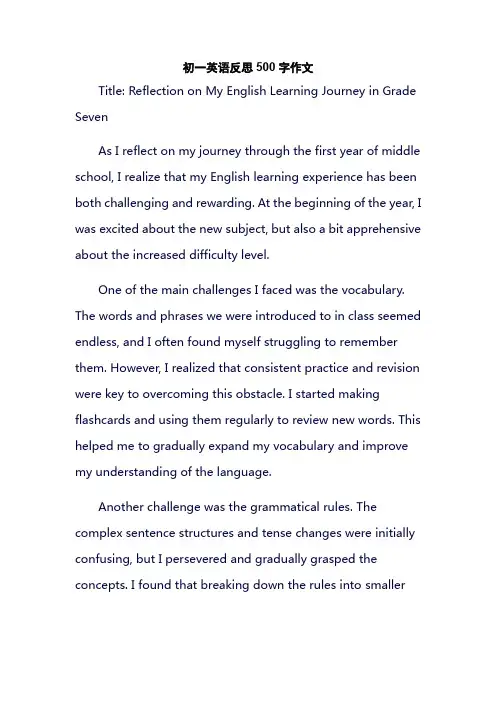
初一英语反思500字作文Title: Reflection on My English Learning Journey in Grade SevenAs I reflect on my journey through the first year of middle school, I realize that my English learning experience has been both challenging and rewarding. At the beginning of the year, I was excited about the new subject, but also a bit apprehensive about the increased difficulty level.One of the main challenges I faced was the vocabulary. The words and phrases we were introduced to in class seemed endless, and I often found myself struggling to remember them. However, I realized that consistent practice and revision were key to overcoming this obstacle. I started making flashcards and using them regularly to review new words. This helped me to gradually expand my vocabulary and improve my understanding of the language.Another challenge was the grammatical rules. The complex sentence structures and tense changes were initially confusing, but I persevered and gradually grasped the concepts. I found that breaking down the rules into smallerparts and practicing them in context made them easier to understand and apply.In addition to vocabulary and grammar, I also learned the importance of speaking and listening skills. Through class discussions and role-playing activities, I improved my fluency and confidence in speaking English. At the same time, listening to English songs and watching movies helped me to familiarize myself with the language and improve my comprehension skills.Looking back, I realize that my progress in English has been steady but slow. There have been times when I felt discouraged or overwhelmed, but I never gave up. I believe that with continued effort and dedication, I will continue to improve and excel in this subject.In conclusion, my journey in English learning has been filled with both challenges and achievements. I have learned that success requires perseverance and hard work, and I am looking forward to continuing my learning journey in the coming years.。
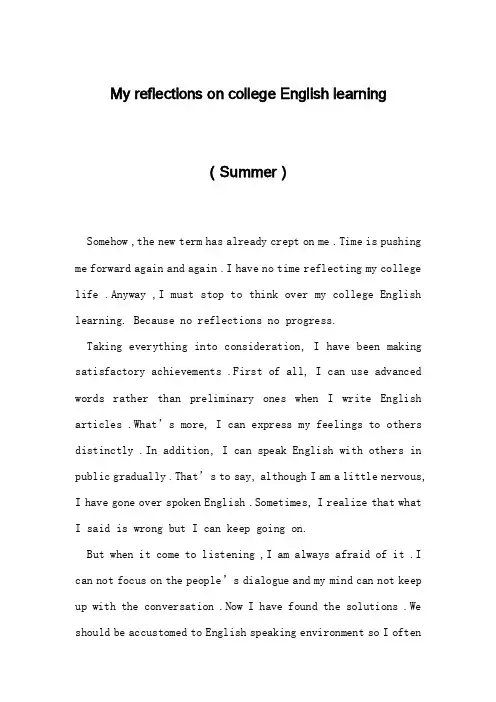
My reflections on college English learning(Summer)Somehow ,the new term has already crept on me .Time is pushing me forward again and again .I have no time reflecting my college life .Anyway ,I must stop to think over my college English learning. Because no reflections no progress.Taking everything into consideration, I have been making satisfactory achievements .First of all, I can use advanced words rather than preliminary ones when I write English articles .What’s more, I can express my feelings to others distinctly .In addition, I can speak English with others in public gradually .That’s to say, although I am a little nervous, I have gone over spoken English .Sometimes, I realize that what I said is wrong but I can keep going on.But when it come to listening ,I am always afraid of it .I can not focus on the people’s dialogue and my mind can not keep up with the conversation .Now I have found the solutions .We should be accustomed to English speaking environment so I oftenwatch English films and it works well.In my mind ,interest is the best teacher .And now it’s my motto .When we like it, we will try it; when we try it with stamina, we will like it more .In a word, we should learn English every time and everywhere.。
My Reflection on Learning EnglishMy history of learning English began when I entered junior high school. For the next three years, I mostly studied reading and grammar in junior high school and never studied English outside school. I was little anxious about such English learning and my future studies, but I wasted enormous time in the futile study of English. When I went to high school, I had no chance to change my idea about learning English, so I studied English because my teacher told me to do so.In the third year at high school, however, I started thinking about my future and studying English in earnest for university entrance exams. According to the trend in the tests I wanted to take, I mainly studied grammar and usage. Of course, I studied reading paragraphs logically. So, I mostly read logical articles, but rarely novels.I entered Chuo University and took the English-English course in the Division of International Law and Business. I took 2 reading classes, 2 speaking and listening classes and I writing class in my first year. In my reading classes, I tried to get used to learning something in English and enriching my vocabulary by reading articles about gender. I also worked hard to improve my writing skill by writing paragraphs logically. In speaking and writing classes, I learned how to research things in English, build my presentations and make my notes clear. Outside university, I tried to read as many articles as I could in order to make my reading speed faster and increase my vocabulary. I frequently read The Japan Times and foreign newspapers.Now, I think my English skills are insufficient. I can read English sentences quickly, but I'm weak at reading very closely and translating into Japanese. So, I'll try to do accurate translation in my seminar, in which I'll read articles about The Oregon Death with Dignity Act. I also have an opportunity to read novels in this class, and I want to enjoy reading them. In listening skills, although I came to beable to listen to English well spoken by native speakers, I'm still poor at listening and writing down what I hear at once. This skill is indispensable for learning English further, because I cannot remember for long what I hear without writing it down. This year, in another speaking and listening class, I have a chance to practice this skill, so I'll make the most of it. As for my writing skills, I'll try to write as fast as possible, so that I can explain what I want to say quickly, which helps me with my speaking skill. In order to develop fast writing, I'll write diaries regularly in my writing class.The same as last year, I want to focus on developing my speaking skills this year. I want to work in international business in the future (a trading company, for example), so this skill will be vital for that type of job. Especially, discussion skills are important in negotiation with foreigners, so I want to develop this skill. In order to have a good discussion, I'll have to explain my thoughts clearly, so I must enrichmy vocabulary to be able to say what I want to say. My goal right now is to find a good way to increase my vocabulary and carry this into action. At the same time, I want to do active debate in English. By the end of this year, I hope to be able to have better discussions than now.Now that I've finished the first semester in this class, I need to reflect on what I could improve and couldn't. The most remarkable point in my progress is that I came to use English actively in the class. Through mini-presentations of Graded Readers and the sharing of the research, I improved my skill of explaining what I want to say in English. Especially, in mini-presentations of Graded Readers, I tried to use easy words and phrases to present information, which helped me to improve my skill of explaining. In addition, my change in the way of learning vocabulary enabled me to use English actively. Until I changed my way of learning vocabulary, I had been satisfied with only looking up the meanings of difficult words, but since I learned about new ways of vocabulary learning, I've increased my newvocabulary of frequently used words and phrases, and now I use English more actively. Furthermore, I improved my listening skills more than ever in this semester. In my Personal English Learning Project (PELP), I listened to English songs and wrote down the lyrics of these songs. Though this work, I've noticed more clearly how English words are connected to each other.My continuing theme of English improvement is to use English even more naturally, not to say as naturally as Japanese. In the second semester of this year, I have two focuses for my English learning: note taking with listening and discussion.To begin with, in my PELP, I started to listen to BBC radio and write down the information I got from it. At first, this didn't work well; I couldn't listen and concentrate on writing at the same time. However, as I continued to do this PELP, my skill gradually developed, and now I am able to catch important words or phrases in speech.My second focus was discussion skill. To improve this, I made effort to collect as much information concerning the issue as possible, which helped me to think more deeply about the issue. In addition, I made for/against tables in which I organized the arguments, reasons and examples. By doing this, I tried to make my arguments clearer and more persuasive. I also noticed the importance of statistics, because without this arguments are weak.Through two years of English learning at this university, I've improved a lot of skills. In the next year, the number of English class I must take decreases. In orderto keep the skills that I have developed and to improve this further, I will have to make more and more effort all by myself. Especially, the skills of listening and speaking will decline if I neglect them, so I'll try to make time for English every week. I also intend to go abroad and feel ‘live English’. This will help me notice the things that lack in my English skills and motivate me to continue to develop my English. I'll do my best in order to prevent my improved skills from getting weaker.。
Name:王晶Class:English 11302Serial Number:21Essay for Intercultural CommunicationDate:Dec.25, 2015.Reflections on the Learning of English Idioms—from the perspective of the relationship between language and cultureIdioms develop in the language practice of common people and intensively reflect the characteristics of language. Idiom, as a part of culture, records and spreads the specific historical and cultural contents of the nation and it is the foundation of textual researches on the history and culture of the nation. English idioms are the most active and interesting part of the English language as well as a high-usage-rate part of spoken English. From the perspective of the relationship between language and culture, learning English idioms is of great significance to master the English language and understand the history and culture of English-speaking countries.Language is a kind of special cultural phenomenon, which belongs to the culture. English idioms are an important part of the culture of English-speaking countries, which are closely related to their cultural traditions. For example, it is inevitable to mention the idiom “the father God” when we refer to the Christian culture. The Trinity of Christianity believes that there is only one God while it contains three persons:the Father God, the Son God, the Holy Ghost. Ethnic taboos in English idioms are also part of the unique social culture of the United States and Britain and other countries. For instance, in the west, people extremely tab oo the figure 13. From the familiar biblical story, we know that “Judas’s kiss” refers to Judas's betrayal of Jesus, who was the thirteenth people in the last supper. Therefore, inwestern countries, hotels neither have the thirteenth floor, nor a room numbered 13. What's more, when westerners treat friends, they avoid inviting 13 guests.Language is the most important carrier of culture, which stores the whole information of culture in a comprehensive way. The strong vitality of culture depends on the information-disseminating function of language and the heritage of culture also benefits from the assistance of language. English idioms record and spread the abundant cultural information and unique cultural features of the English language in every field such as geography, history, religion, social customs and education and play a decisive role in the inheritance and development of cultures in English-speaking countries. A large number of English idioms describing the navigation and fishing life of British people, such as “all at sea”, “in low water”, “on the rocks”, “to keep one’s head over water”, “get a break”, “take the bait”etc., record the simple early life of the British people and show the important position and role of the navigation industry in the British people's life. The idiom “give someone the wall” records the social scene in medieval England. At that time, there was no sidewalk and the path against the wall was found to be smooth and safe. Out of politeness, the pedestrians often gave this safer way to women or people whose status are higher. This kind of upbringing in social communication and respect for women are still vital traditional contents of the British gentry demeanor and the knight spirit."Language is a mirror of social culture". Language understanding is a dimension of cultural understanding, meanwhile, language understanding requires cultural understanding. The higher the level of language understanding, the higher the level of cultural understanding, and the more the needs for cultural understanding. Westerners, most of the time, describe acrowd of people as “i t was parked like sardines”.Maybe some Chinese people are able to understand this analogy, but not all can appreciate its beauty, for not so much Chinese people have ever seen an opened, small and flattened, canned box tightly packed with neat rows of finger-length sardines. Given another example, to understand the idiom “as wise as owls”, we must be acquainted with the fact that owls are considered as intelligent animals in western countries, which is exactly the opposite to the unlovely and ominous image of the owl in china. Without being familiar with this cultural preference, learning this idiom will be puzzling.Culture influences and restricts the content and form of language and its development also helps to promote the development of language. The nature of culture determines the object of language and the way of expression in the context of this culture. Complicated cultures and ways of life, modes of thinking are inseparable from the language description and communication in this boundless world, so the influence of the development of culture to language should not be underestimated. English idioms develop on the basis of cultures of English-speaking countries. The cultural trends derive from different regions and different times have decisive impact on the content, form and development of English idioms. For example, critics, out of dissatisfaction with the political stance of the former U.S. president Clinton, gave a new meaning to the word "Clinton" and created a lot of new idioms, mocking that "a Clinton" is "a thorough reform", "half Clinton" is "a conventional reform", "full Clinton" is "reform by feeling", "double Clinton" is "to reform again and again". In another example, the fifteenth century is the era of large, luxury Gothic clothing with no pockets in England, people wrote the words on the cuffs to avoid forgetting. Hence, the idiom “havesomething in one 's sleeve” means cut ting oneself a slice. Similar idioms are “give up one' s loins”, “apple-pie order” and so on.Language is the crystallization of cultural awareness, while it also has a huge reaction force toward the culture. The development of language has a huge impact on the development of culture. In the process of spreading and inheriting the ethnic cultures of English-speaking countries through idioms, the variation of idioms and their uses enrich the content of the culture. For example, the idiom “get up from the wrong side” reflects that westerners think it is unlucky to get out of bed with the left foot landing first. That is why until today, many brides still stick to this traditional custom when entering the church. Even in some hotels, there is still a doorman to remind the guests to enter the store with the left foot advanced. This kind of reaction force also can be seen in the daily use of the color words in English idioms. Using red as an example, “in the red” refers to the cases of economic constraints or debt s, “to see red” says some one is in anger. In the west, the color red has pejorative meanings like anger, bloodiness and confusion. So matadors use red clothes to enrage the bull and fiscal gap usually records with red ink. On the contrary, red is the traditional color of China and a symbol of happy, joyful and festive atmosphere, people hang red lanterns during the Spring Festival and give red packets to children.To sum up, whenever people learn a language of a nation, they are also learning the culture of this nation. The development of English idioms and the development of the cultures of English-speaking countries are inseparable. Accurate knowledge of English idioms helps us to understand the history, culture and national characteristics of English-speaking countries and thus to use English more accurately and vividly. What’s more, English idioms, developingalong with the social development of English-speaking countries, are permeated with a strong culture. Learning English idioms is a simple but efficient way to have a profound and thorough understanding of cultures of English-speaking countries.References:The outline of academic speech at the founding conference of Chinese Cultural Institute by Professor Xu Jialu, dean of the Institute of Chinese culture at the Beijing Normal University in October 9th.The Relationship between Language and Culture Nie Hongying。
Reflection 4How to a Good English LearnerAs a student, it is most important to have good study skills because students practiced every day in order to improve their self, moreover it can be the key to success in school. Imagine that the students review and study their lesson regularly, the more skillful students become at studying, the more students can concentrate to do efforts and do their best work.Good students’ posses’ presence of both physical and mental interest in learning. Also a good listener, retains what is being said, and has a confidence to ask questions. One of the best ways to help understand something is to ask questions about it. Asking questions is very important skills to acquire; it helps to clarify what students want to find out. In addition good students always set goals; it indicates that something needs to be done to improve students study habits. Students need to establish reasonable goals that achieve without being discourage. Moreover, students must set long term and short term goals to generalize what students want to learn.To be a good English learner, one should have a proper study plan and be good at thinking and solving problems with the help of a dictionary. One also has to sum up what he has been learned every day. We should seize every chance to learn English and make good use of all kinds of learning resources. Speaking English with your partners are all nice methods, especially when we have little chance to communicate with foreigners. We should also learn together in a group so that we can share our suggestions.Remember that diligence and good methods are the key to success.。
英语自我检讨书100字Self-Reflection on English LearningIn this self-reflection, I would like to express my thoughts and feelings regarding my English learning journey. Looking back, I can see areas where I have made progress and areas that still require improvement.Chapter 1: Progress in Speaking SkillsOver the past few months, I have become more confident in speaking English. I have successfully participated in class discussions and engaged in conversations with my classmates. My pronunciation has improved, and I am now able to express my ideas more clearly.Chapter 2: Enhancing Reading ComprehensionI have dedicated time to reading English literature and articles. This has helped me expand my vocabulary and develop a better understanding of different writing styles. However, I still need to work on my reading speed and comprehension skills to fully comprehend complex texts.Chapter 3: Writing with ClarityThrough practice and feedback from my teachers, I have learned tostructure my writing more effectively. I have also become aware of grammar errors and have made efforts to minimize them. However, I need to work on expressing my ideas more eloquently and using a wider range of vocabulary.Chapter 4: Listening AttentivelyI have discovered the importance of active listening during English lessons. By focusing on the speaker, I have improved my listening skills and can now understand conversations and lectures more accurately. However, I still encounter difficulties when it comes to understanding native speakers or deciphering unfamiliar accents.Chapter 5: Cultural AwarenessOne aspect I have gained from learning English is a deeper understanding of various cultures. Through books, movies, and conversations, I have gained insights into different customs, traditions, and ways of life. This has broadened my perspective and made me more open-minded.Chapter 6: Future GoalsIn the coming months, I plan to further enhance my English skills. I aim to participate in more English-speaking activities, such as joining alanguage exchange program or practicing with native speakers. Additionally, I will continue to read extensively and cultivate my writing skills.In conclusion, while I have made progress in my English learning journey, there are still areas for improvement. With dedication and perseverance, I am confident that I will continue to advance and achieve my language goals. English learning is a lifelong journey, and I am excited to embrace the challenges and opportunities that lie ahead.。
英语反思400字作文Title: Reflection on Learning English。
Learning English has been a journey filled with challenges, breakthroughs, and self-discovery. Through this process, I've come to realize the importance of perseverance, consistency, and embracing mistakes as opportunities for growth.One of the major challenges I faced when learning English was overcoming the fear of making mistakes. I used to hesitate to speak or write in English because I was afraid of being incorrect or misunderstood. However, as I progressed in my studies, I learned that mistakes are an essential part of the learning process. Each mistake is an opportunity to identify areas for improvement and to refine my language skills. Embracing mistakes allowed me to gain confidence and become more fluent in English.Consistency has also played a crucial role in myjourney to learn English. Initially, I struggled to maintain a regular study routine amidst other commitments and distractions. However, I soon realized that consistent practice is essential for language acquisition. I made a conscious effort to dedicate time each day to studying English, whether it was through reading, listening to podcasts, or practicing speaking with native speakers. Over time, I noticed significant improvements in my language skills, which motivated me to continue my efforts.Furthermore, immersing myself in the English language and culture has been instrumental in my learning journey. I sought out opportunities to engage with native speakers, either through language exchange programs or by participating in online communities. By interacting with native speakers, I not only improved my language skills but also gained insights into their culture, idiomatic expressions, and nuances of communication. Immersion allowed me to develop a deeper understanding and appreciation for the English language.Reflecting on my journey, I am proud of how far I havecome in learning English. However, I also recognize that there is always room for improvement. Moving forward, I intend to continue challenging myself and expanding my language proficiency. I plan to explore more advanced topics, such as literature and academic writing, to further enhance my language skills. Additionally, I aim to continue immersing myself in the English-speaking environment to maintain fluency and cultural understanding.In conclusion, learning English has been atransformative experience that has taught me valuable lessons about perseverance, consistency, and the importance of embracing mistakes. By overcoming challenges and dedicating myself to consistent practice, I have made significant progress in my language journey. I am excitedto continue growing and evolving as a proficient English speaker.Thank you for reading my reflection on learning English.。
英语反思300字作文初一Title: Reflecting on My English Learning Journey。
English Reflection。
English learning has been an intriguing journey for me since I started studying it in middle school. Reflecting on my progress, I realize how much I've grown and how far I've come in just a short period.When I first embarked on this journey, I found English challenging. The grammar rules seemed like a maze, and pronunciation felt like tongue twisters. However, with perseverance and dedication, I gradually began to unravel the complexities.One aspect that significantly contributed to my improvement is consistent practice. I made it a habit to allocate a portion of my daily schedule to English exercises, whether it was reading English books, watchingEnglish videos, or practicing speaking with classmates. Each activity contributed to honing different language skills, gradually making me more proficient.Furthermore, I learned to embrace mistakes as stepping stones to success. Initially, errors in grammar or pronunciation would discourage me, but I soon realized that they were valuable learning opportunities. By identifying my mistakes and understanding the reasons behind them, I was able to rectify them and enhance my English skills further.Another crucial element in my English learning journey was seeking feedback. Whether it was from my teachers, peers, or online language forums, I actively sought constructive criticism to pinpoint areas for improvement. Constructive feedback helped me identify my strengths and weaknesses, allowing me to tailor my learning approach accordingly.Moreover, immersing myself in English-speaking environments played a pivotal role in enhancing my languageproficiency. Engaging in conversations with native speakers during exchange programs or online language communities provided me with real-life exposure to the language, helping me improve my listening and speaking skills significantly.As I reflect on my English learning journey, I am proud of the progress I've made. From grappling with basic grammar to confidently expressing myself in English, the journey has been transformative. Moving forward, I am committed to continuing my language learning endeavors, knowing that the journey of mastering a language is a lifelong pursuit filled with challenges and rewards.。
Reflection 1
How do I Learn English
As an English major student, I am confident thatI have basically mastered the skills and methods. But, I have to improve myself day by day.
It is known to all that language learning is not only a kind of knowledge, but a kind of practice. Practice makes perfect. In learning a foreign language, Marx has set a good example. From the very beginning I spared no pains and paid as much attention as possible to listening, speaking, and reading and writing. I read the English stories with great interest and learn to keep English diary every day. Now I am able to appreciate English poetry.
The following descripts how I learn English every day. First, I practice English as much as possible. Just as the saying goes, practice makes the perfect. Ilisten to the radio like BBC, VOA and so on. It’s not necessary to spend too much time on listening. Second, I choose some fantasticmaterials which I aminterested in. So, it won’t feel bored me when practicing. Third, Ichose the tapes while are not difficult; we can add the difficult day by day. Third, I have to find out an effective way. I can do some listening, speaking, reading and writing in or out of the class.
No matter how excellent we are, we still have a long way to go.。